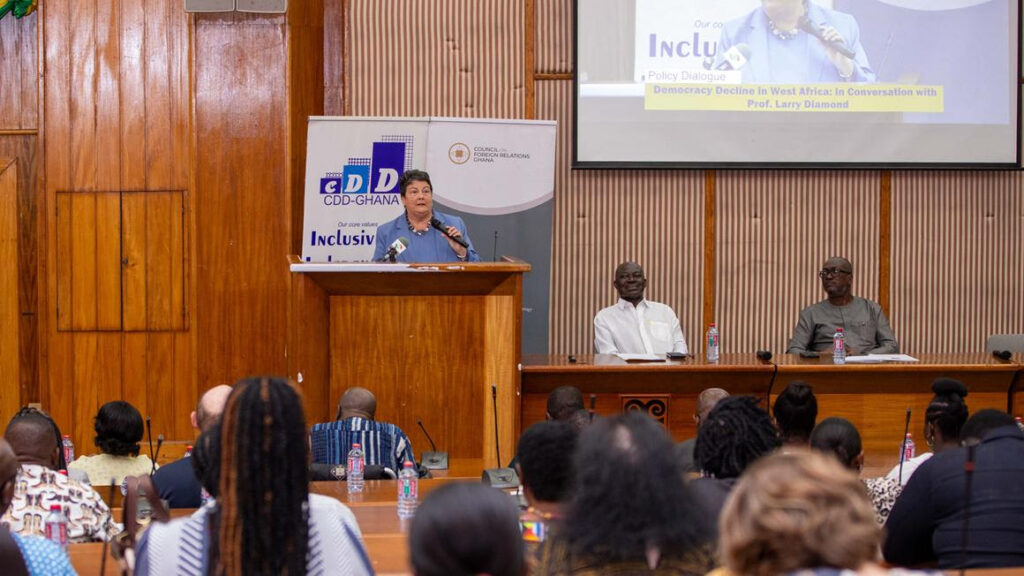We must fight for and protect democracy everyday – US Ambassador to Ghana

The US Ambassador to Ghana, has reiterated that democracy is not something that must just be checked in a box, but must be fought for and defended everyday.
Ms Virginia Palmer who was speaking at an event organised by the CCD-Ghana to discuss the decline of democracy in West Africa said: “I am conscious as the Ambassador that the United States and Ghana have their elections almost at the same time…that democracy is not something we say check – accomplished and then move on to enjoy.
We have to fight for and protect it every day. We have to fight injustice and discrimination. We have to fight encroachment on democratic institutions. We have to beef up the institutions that are responsible for delivering democracy.”
The Ambassador indicated that democracy must not be thought of just in terms of the ballot box, “we have to think about it in terms of governance and delivery of service, inclusive economic growth, justice for our citizens, and only then will democracy be safe,” she said.
Citing institutions in Ghana such as the National Peace Council, the National Commission on Civic Education, the Electoral Commission, and the Ghana Police Service, she said they play critical roles in Ghana elections.
“The National Peace Council and the National Commission on Civic Education are two uniquely Ghanaian institutions that could – and should – be copied around the world. Their efforts ensure that the voice of the Ghanaian people is not only heard, but also respected and acted upon,” she said.
Ms Palmer noted that in recent years, some parts of West Africa have witnessed a distressing decline in democratic norms and weakening of democratic institutions. This decline, she said, has been characterized by a resurgence of authoritarian regimes, a rise in violent extremism, pervasive corruption, alarming human rights abuses by security forces, discrimination against minorities, restrictions on press freedom and free speech, and a failure to share economic prosperity equitably.
“These factors not only undermine the fabric of democracy but also erode trust in the very institutions meant to safeguard human rights. Those countries that stepped away from democracy are now even less secure than they were before their democratically elected governments were replaced by military juntas,” she added.
She pointed out the incidents of multiple occasions of rampant and state-sponsored disinformation used to manufacture narratives and spread false information that undermines elected governments.
“That’s not to say these West African elected governments were perfect, they weren’t. I think something that’s very important today is the need for consistency in calling out attacks on democracy. Not just by soldiers but by all kinds of people and with disinformation, corruption, and discrimination.
The massive onslaught of disinformation undermined their democratically elected government mandate, accelerated their downfalls, and made life for the citizens of those countries more complicated, not less,” she said.
Citing a study by the Africa Center for Strategic Studies released earlier this month, she said it found that disinformation campaigns in Africa have surged nearly four-fold since 2022.
“That’s 189 documented disinformation campaigns in Africa, of those nineteen campaigns have targeted Mali, Burkina Faso, and Niger since 2018.
Make no mistake, disinformation is not the only reason for the decline of democracy in West Africa. It’s also about the inability of elected governments to deliver on their promises, share economic prosperity, fight corruption, uphold the rule of law, bolster democratic institutions, improve security, and deliver for the people,” she said.
Ms Plamer added: “And I used to think there was a continuum between security and liberty and democracy. I have come to realize that it’s not really that simple. I used to think that mothers and fathers would make a choice to surrender some liberties to protect their children, but in the end it’s not that simple. Discrimination against minorities causes grievances and makes those groups vulnerable to recruitment by violent extremists, for example, which can then create a downward spiral for security.
Corruption also undermines the institutions that protect security and again creates a vicious downward spiral.”
The Ambassador stated that when a democratic government fails to live up to expectations, the solution is MORE democracy, NOT LESS. That’s important to remind people.
“Millions of people around the world living under less free regimes still clamour for democracy every day. Still, as we’ve seen around the world, democracy can be fragile. It needs to be protected and it needs to deliver for the people.
President Biden has made the defense of democracy a core pillar of American diplomacy. Just last week, Secretary of State Blinken attended the third Summit for Democracy in Seoul, South Korea. President Biden launched the first Summit for Democracy in 2021 as a forum to share ideas and organize collective action to address emerging challenges to democracy. At this year’s Summit, Secretary Blinken highlighted collective and individual countries’ efforts to fight corruption, promote free and fair elections, protect independent media and journalists, and uphold and defend human rights,” she said.
She further noted among others that building a strong, inclusive economy is also one of the best ways to support democratic principles.
“Through multi-year implementation of the Strategy to Prevent Conflict and Promote Stability (SPCPS), the United States is working to do that in Coastal West Africa. We focus those efforts in Ghana on inclusive economic growth and projection of state services in Ghana’s much poorer north and to the protection and inclusion of vulnerable populations on Ghana’s borders,” she said.
By Emmanuel K Dogbevi
